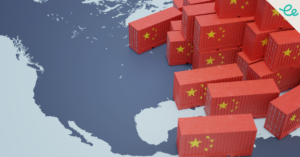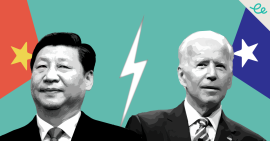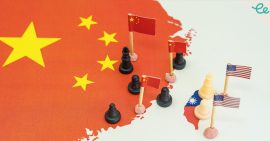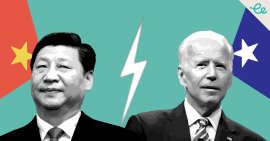While tough trade talks continued, US officials laid out the large extent of Chinese economic espionage in the USA, with indictments against Huawei and China-related spying investigations in nearly all of the FBI’s 56 field offices nationwide. “China writ large is the most significant counterintelligence threat we face,” warned its director. This article is a summary of major US China news in January 2019.
The US Justice Department filed nearly two dozen criminal charges against Chinese telecoms giant Huawei for a “company-wide effort” to steal trade secrets from T-Mobile USA. The indictments, marking an escalation in the US-China confrontation, represent a primer on “how they do IP theft”, suggested one US lawyer.
Donald Trump met his opposite number Xi Jinping’s top economic aide, Liu He, after trade talks in Washington. The US President cautioned that no final deal will be made until he met “my friend President Xi” to “agree on some of the long standing and more difficult points”. China is rushing through a new foreign investment law to supersede existing legislation. The move, timed to influence the trade talks, should ban “forced” technology transfers.
Ahead of those talks, US Commerce Secretary Wilbur Ross warned that the two sides remain “miles and miles” from resolving trade issues such as the structural reforms Washington seeks, and enforcement mechanisms. But Ross estimated there´s a fair chance of reaching a deal.
At Davos, foreign executives told one of China’s top regulators their concerns about intellectual property, the ownership structure of state-owned enterprises, and the Made in China 2025 policy. Xi didn’t attend – and so missed being called the “most dangerous opponent of open societies” by billionaire financier George Soros. “China is not the only authoritarian regime in the world but it is the wealthiest, strongest and technologically most advanced,” said Soros.
The verdict of US Trade Representative Robert Lighthizer, after trade war negotiations in Beijing last week: No progress on structural issues, but some analysts sounded upbeat that a short-term resolution will happen by the summer. While US lawmakers introduced bills to ban the sale of US chips to Chinese telecoms firms that violate sanctions or export laws, the Huawei founder rejected spying claims and said he would never harm his customers or other countries.
China’s army is “on the verge of fielding some of the most modern weapon systems in the world,” noted a major new US assessment. “In some areas, it already leads the world.” In one potential flashpoint, the UK and US held joint naval drills in the South China Sea. Top planner Lian Weiliang pledged that China will press ahead with investments in AI and 5G in 2019.
Trade talks in Beijing delivered modest progress – China will buy more US goods and services – but left multiple hurdles to clear if the tariff war is not to resume come March 1. US suspicion of Chinese tech was highlighted by two senators seeking to create a White House office to fight state-sponsored technology theft. “We are not saying don’t invest in China or with China, but know the risk,” warned the head of a US government campaign against foreign hackers. More than 90% of economic espionage cases brought by the US Justice Department since 2011 have involved China.
As car sales fell for the first time in two decades, Elon Musk broke ground in Shanghai for the Tesla “Gigafactory”, and was so effusive China’s Premier offered him a green card. Amid the trade war “truce”, a US delegation will shortly head for talks in Beijing, four decades after the USA and China established diplomatic relations. The State Dept’s new travel warning for China urged “increased caution”. A clash of civilisations lies at the heart of the bitter geostrategic competition, explained one expert.
China’s top prosecutor declared there is “no doubt” the two Canadians detained in retaliation for the arrest of Huawei’s CFO broke Chinese law. China’s Chang’e 4 lunar spacecraft made history as the first probe to visit the far side of the moon. And score a major geopolitical win for Beijing in its military-backed space race with Washington. “Today the fight (between China and the US) is on trade. Tomorrow it can be on the moon,” said one researcher.







Comments are closed.